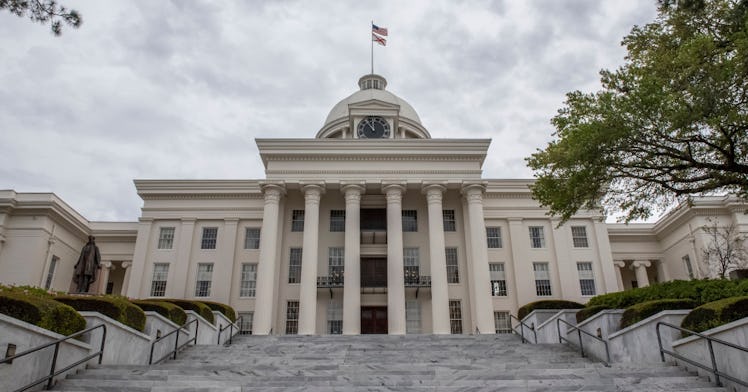Families, Physicians File Lawsuit Against Alabama’s Anti-Trans Law To Protect Kids
The lawsuit states the bill — which makes gender affirming care a felony in the state — violates the Fourteenth Amendment of the US Constitution's equal protection clause.

On Monday, a lawsuit was filed against the state of Alabama in federal court on behalf of two families with transgender teens and two physicians. The suit aims to overturn a bill signed into law just last week in the state that makes it a felony crime for doctors to treat trans youth who are under 19 years old with hormones or puberty blockers that affirm gender identity. Here’s what you need to know.
Days ago, the Alabama Senate approved two new bills that limit the rights of transgender youth in the state. One is similar to Florida’s Don’t Say Gay Bill, and the second – SB 184, also dubbed the Alabama Vulnerable Child Compassion and Protection Act – bans medical gender-affirming services to trans youth. The bill, which passed on April 7, now makes it a felony punishable by up to 10 years in prison for physicians who provide medical care to trans youth.
The law will go into effect on May 8th, unless it’s blocked by the court. And now the parents of a 17-year-old transgender boy (named John Doe in the filings) in Shelby County and parents of a 13-year-old transgender girl (named Mary Roe in the filings) in Jefferson County, plus two physicians in the state, are looking to have the bill blocked.
The lawsuit, which doesn’t name the parents to keep the kids’ identities private, states the bill violates the Fourteenth Amendment of the US Constitution’s equal protection clause. It also goes into detail about the harm that would come for their children should the bill go into effect.
“For Mary to be forced to go through male puberty would be devastating; it would predictably result in her experiencing isolation, depression, anxiety, and distress,” the lawsuit reads. “Mary’s parents are also concerned that without access to the puberty-blocking medication she needs, Mary would resort to self-harm as a means of coping with her psychological distress or even attempt suicide.”
The doctors are identified in the court filings as Dr. Morissa J. Ladinsky and Dr. Hussein D. Abdul-Latif. Both physicians work with trans children and provide care at the Children’s Hospital of Alabama. In addition, they’re both medical staff members at the University of Alabama at Birmingham Hospital, and they warn that the bill is undermining the medical needs of patients.
“By signing SB 184 Governor Ivey has told kind, loving, and loyal Alabama families that they cannot stay here without denying their children the basic medical care they need,” Dr. Ladinsky said in a statement. “She has undermined the health and well-being of Alabama children and put doctors like me in the horrifying position of choosing between ignoring the medical needs of our patients or risking being sent to prison.”
This latest bill is one out of a trend that’s sweeping across the country with bills that take aim at reducing the medical care that trans youth can have access to. This is health care that has been proven to reduce the risk of mental and emotional harm in one of the most vulnerable populations — trans kids. Prominent medical associations including the Pediatric Endocrine Society, American Medical Association, and American Psychological Association have recognized the importance of gender-affirming care for minors. Despite this, there are currently 25 states that have some type of anti-trans legislation working its way through the court systems.
The lawsuit has the support of the American Civil Liberties Union (ACL), the Transgender Law Center, and Lambda Legal, who warned there would be a lawsuit should Hill SB 184 be made law. “Threatening providers with prison time or fines as a result of their dedication to their patients is ruthless,” a statement read after the bill was approved by the Alabama Senate. “Above all, our goal is to ensure that trans youth become trans adults, and bills like this are antithetical to trans people thriving in this country.”
This article was originally published on